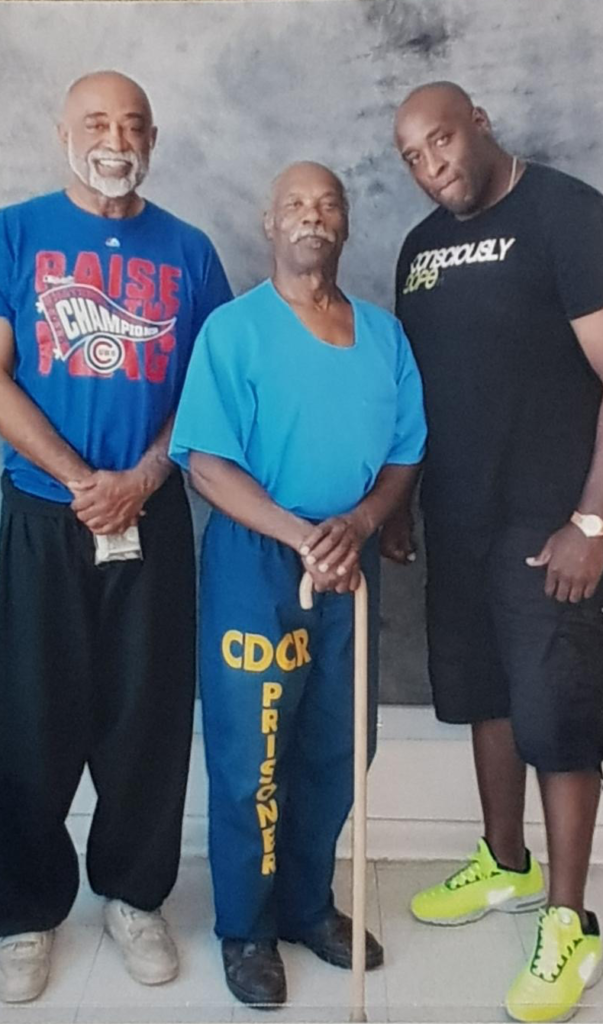Feature image: Romaine “Chip” Fitzgerald. Photo: Freedom4chip.org. Used with permission.
After 51 long years persisting in the corrupt California prison system, former Black Panther Romaine “Chip” Fitzgerald passed away on March 29 at the age of 71. The cause of death has not been disclosed. Fitzgerald joined the Southern California Chapter of the Black Panther Party in 1969 as a youth recently released from the California Youth Authority. At the time of his death, he was the longest-held political prisoner from the Black Panther Party after his capture by the California Highway Patrol.
Fitzgerald was born on April 11, 1949, and grew up in the Watts/Willowbrook area of Los Angeles. His mother was a domestic worker from Louisiana who taught him the skills of gardening, knitting and crocheting. His father was a worker with the Los Angeles Department of Water and Power, originally from Oklahoma.
Harry Carey, a longtime friend of Fitzgerald’s who helped coordinate the campaign for his freedom, spoke with Liberation News about what got Fitzgerald involved in the movement. “We were brought together in this movement by the four little girls who were blown up in the 16th Street Baptist Church [a 1963 anti-Black terrorist attack in Birmingham, Alabama]. We got a chance to redeem ourselves by protecting them from those who killed him. We got a chance to stand up to that violence that is a part of American reality,” Carey said.
Fitzgerald’s story is a tragic example of the violently racist system in the United States. The tragedy of his life showed that there are prison officials, judges, and politicians who would rather lock a teenager in prison for five decades than give him the tools to succeed outside of prison. Fitzgerald spent more than 70 percent of his life locked behind walls rather than in his community, for a crime he openly lamented and regretted committing. The guilt was magnified by the torturous conditions of California prisons, forcing him to see psychiatrists to keep his own mental health strong.
Fitzgerald had been eligible for parole since 1976, but due to a grudge California’s prison officials held against all Black Panthers and freedom fighters, he never got his release. He suffered a terrible stroke in 1998, rendering him partially paralyzed for the rest of his time in California State Prison in Lancaster, California. The prison system did not see a man who had shown remorse, sympathy, compassion, and reform — they saw a Black man who joined a revolutionary organization and deserved to suffer.
Even facing the decades of confinement, Fitzgerald wrote numerous pieces of literature on his plans after release, a materialist analysis of the creation of music, and more. For his plans after being released, he wrote:
I will welcome the warmth and laughter of my grandchildren. I look forward to their hugs and smiles. I will be the Grandpa present to soothe them through occasional scrapes after they show me their somersaults and expert bike riding maneuvers.
I will experience the waves of the ocean reflecting the moon filled sky and the cozy breeze and graceful winds upon my skin. I will be outside in nature’s healing environment as it soothes and comforts my body allowing my age filled bones to heal and rejuvenate in ways lost for most of my life.
I will always give special devotion to finding peace and moving full speed to overcome the damaging impact associated with the daily screams of terror and absence of dignity that have engulfed my prison environment.
Most of all, I will be dedicated to the journey and opportunity of spending my remaining life giving. Giving of myself to achieve the many treasures of what it means to be a valued human being; embracing freedom.

For those who knew him, Chip Fitzgerald was a dedicated, lifelong learner who did not let his captivity deter him from education. Even as a prisoner, his kindness and love for others shone through as he helped other incarcerated individuals build reading and writing skills through the UC Berkeley Prison Project where he was a top member. Additionally, he excelled in expanding his scope of knowledge — he took college courses on anthropology, environmental biology, electronics and much more.
Chip Fitzgerald was an educator, a DJ, a father and above all an incredible human who did not deserve five decades of neglect, torture and abuse. Carey also added: “It is an honor to have been his friend and comrade. At this age, you realize that you get some honors and some things you can be proud of. This is one of them.”
The Los Angeles chapter of the Party for Socialism and Liberation held a letter-writing session to Fitzgerald in November 2019. Harry Carey attended to deliver a message of solidarity and hope for Chip Fitzgerald’s release. In Black August 2020, the Sacramento branch of the PSL collaborated with the Los Angeles branch for a letter-writing session to both Chip Fitzgerald and Ruchell Magee.
We are honored to uplift the life and sacrifice of this freedom fighter, who continues to live on through his son, eight grandchildren, two great grandchildren, 15 nieces and nephews, and all those that he has inspired. Black Panthers, Black August members, and advocates for justice across the country fought tirelessly for his release, but the work does not end with his transition to the ancestors. We will continue the struggle for freedom for all political prisoners facing racist oppression and exploitation and for the liberation of the Black community. Fitzgerald’s transition underscores the urgency of ending the catastrophe of oppressed youth and elders being abandoned inside the dark dungeons known as prisons.
Chip Fitzgerald, presente!
Read more of Chip Fitzgerald’s writings, his life story, and more here.




